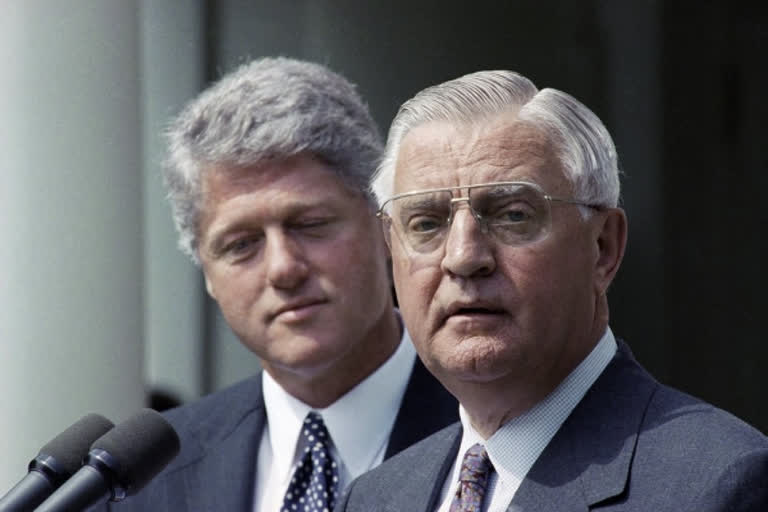Minneapolis:Former Vice President Walter F. Mondale, a liberal icon who lost one of the most lopsided presidential elections after bluntly telling voters to expect a tax increase if he won, died Monday. He was 93.
The death of the former senator, ambassador and Minnesota attorney general was announced in a statement from his family. No cause was cited.
Mondale followed the trail blazed by his political mentor, Hubert H. Humphrey, from Minnesota politics to the U.S. Senate and the vice presidency, serving under Jimmy Carter from 1977 to 1981.
Read:US President Biden announces complete troop withdrawal from Afghanistan
In a statement Monday night, Carter said he considered Mondale “the best vice president in our country’s history.” He added: “Fritz Mondale provided us all with a model for public service and private behavior.”
Mondale’s own try for the White House, in 1984, came at the zenith of Ronald Reagan’s popularity. His selection of Rep. Geraldine Ferraro of New York as his running mate made him the first major-party presidential nominee to put a woman on the ticket, but his declaration that he would raise taxes helped define the race.
On Election Day, he carried only his home state and the District of Columbia. The electoral vote was 525-13 for Reagan — the biggest landslide in the Electoral College since Franklin Roosevelt defeated Alf Landon in 1936. (Sen. George McGovern got 17 electoral votes in his 1972 defeat, winning Massachusetts and Washington, D.C.)
“I did my best,” Mondale said the day after the election, and blamed no one but himself.
“I think you know I’ve never really warmed up to television,” he said. “In fairness to television, it never really warmed up to me.”
Years later, Mondale said his campaign message had proven to be the right one.
“History has vindicated me that we would have to raise taxes,” he said. “It was very unpopular, but it was undeniably correct.”
In 2002, state and national Democrats looked to Mondale when Sen. Paul Wellstone, D-Minn., was killed in a plane crash less than two weeks before Election Day. Mondale agreed to stand in for Wellstone, and early polls showed him with a lead over the Republican candidate, Norm Coleman.
But the 53-year-old Coleman, emphasizing his youth and vigor, out-hustled the then-74-year-old Mondale in an intense six-day campaign. Mondale was also hurt by a partisan memorial service for Wellstone, in which thousands of Democrats booed Republican politicians in attendance. One speaker pleaded: “We are begging you to help us win this election for Paul Wellstone.”
Read:US President Biden greets Muslims on Ramzan
Polls showed the service put off independents and cost Mondale votes. Coleman won by 3 percentage points.
“The eulogizers were the ones hurt the most,” Mondale said after the election. “It doesn’t justify it, but we all make mistakes. Can’t we now find it in our hearts to forgive them and go on?”
It was a particularly bitter defeat for Mondale, who even after his loss to Reagan had taken solace in his perfect record in Minnesota.
“One of the things I’m most proud of,” he said in 1987, “is that not once in my public career did I ever lose an election in Minnesota.”
Years after the 2002 defeat, Mondale returned to the Senate to stand beside Democrat Al Franken in 2009 when he was sworn in to replace Coleman after a drawn-out recount and court battle.
Mondale started his career in Washington in 1964, when he was appointed to the Senate to replace Humphrey, who had resigned to become vice president. Mondale was elected to a full six-year term with about 54% of the vote in 1966, although Democrats lost the governorship and suffered other election setbacks. In 1972, Mondale won another Senate term with nearly 57% of the vote.
His Senate career was marked by advocacy of social issues such as education, housing, migrant workers and child nutrition. Like Humphrey, he was an outspoken supporter of civil rights.
Mondale tested the waters for a presidential bid in 1974 but ultimately decided against it. “Basically I found I did not have the overwhelming desire to be president, which is essential for the kind of campaign that is required,” he said in November 1974.
